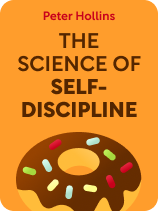

This article is an excerpt from the Shortform book guide to "The Science of Self-Discipline" by Peter Hollins. Shortform has the world's best summaries and analyses of books you should be reading.
Like this article? Sign up for a free trial here.
Do you give in to impulsive behavior? Do you know how to gain self-discipline?
Peter Hollins, the author of The Science of Self-Discipline, has a variety of internal strategies to improve your discipline in the long run. By becoming more self-disciplined, you’ll be able to endure the distractions life throws at you and steadily progress toward your goals.
Let’s look at how to gain self-discipline with these emotional and logical tools.
Develop Internal Discipline
It’s possible to improve discipline through practice, but you must also be careful not to overdo it. So, Hollins explains that taking a measured approach to developing discipline will make it sustainable. In this article, we’ll discuss Hollins’s emotional tools to learn how to gain self-discipline, as well as logistical strategies to help you build disciplined habits.
Emotional Tools to Build Discipline
To develop a disciplined mindset, Hollins offers the following strategies.
Find Your Reason to be Disciplined
According to Hollins, if you have a clear idea of what you want to achieve through discipline, it will motivate you to keep your healthy habits on track and persevere through challenging moments.
Hollins explains that there are three main categories of motivation: independence, excellence, and service. A motivating goal will relate to at least one of these categories.
1. Independence: This is a sense that you have the freedom to decide your actions. When you feel in control of your life and work, you’re motivated to be more engaged and productive.
2. Excellence: This is your innate desire to improve at things. When you feel motivated to get better at something, there’s practically no end to this drive because it’s impossible to be perfect at anything.
3. Service: This is the idea that your discipline will have a meaningful effect on the world. For example, if you believe that the smoothie shop you’re disciplined to save money for will bring joy and nutrition to your community, you’ll probably be more motivated to follow through with opening it than someone who is opening a business solely for personal profit.
Don’t Fight Your Impulses, Observe Them
Hollins says that if you fight your urges, it makes them last longer and grow stronger, which puts you at greater risk of succumbing to them. You probably already know this if anyone’s ever told you not to think about something. When you try to suppress a thought, your focus on that topic typically grows stronger. So, instead of suppressing your urges, allow yourself to experience them with an awareness that they’re temporary. Hollins explains that this will help you stop identifying with your emotions and give you a position of power over them, which allows them to pass more easily. One way to do this is to picture your urge as a passing storm that comes on strong and then fades away.
Remind Yourself That You’re Capable of Maintaining Discipline
Hollins emphasizes the importance of believing that you’re capable of maintaining discipline to reach your goals. To affirm your strength when you feel weak, remember these tips:
Practice the 40% Rule. Developed by Navy SEALs, this rule means that when you feel like you’ve reached your physical or mental limit amidst a challenge, you’ve only exerted about 40% of what you have left in the tank. The 40% rule is supported by evidence for the placebo effect, which is the influence our beliefs have on real-world outcomes. If you believe you have what it takes to maintain discipline—even when it gets hard—you’ll find the willpower to keep going.
Remember the progress you’ve already made. By giving yourself credit for how far you’ve already come in your journey to your goal and taking inventory of the ways you’re capable of achieving your goal, you’ll empower yourself to push forward.
Consider Your Future Self
Hollins suggests that you can delay gratification to gain more in the long run if you identify with your future self. When you realize your future self will reap whatever seeds you sow in the present, you’ll be less likely to give in to fruitless temptations. Consider how your future self will be able to enjoy relaxation and fun more wholly when you know you’ve already accomplished the things you were supposed to. If you don’t do what you’re supposed to, you’ll likely be stressed about it.
To think about your future self more easily and avoid unhealthy rationalizations, apply the 10-10-10 rule. This means thinking about how the decision you’re facing will affect you 10 minutes from now, 10 hours from now, and 10 days from now. To demonstrate the 10-10-10 rule, imagine you want to stop working to watch TV. Consider how in ten minutes you’ll have made no further progress on your tasks. In ten hours, you’ll probably have forgotten whatever you watched on TV, but you’ll still be bothered by the work you still need to finish. In ten days, the TV you watched will have been inconsequential to progressing toward your goals, but any work you completed will have brought you that much further along.
Logistical Tools to Build Discipline
While it’s important to develop a disciplined mindset, Hollins also suggests some practical strategies to help you build lasting habits that will push you toward your goals.
Build Discipline Using the 10-Minute Rule
Hollins recommends that if you’re tempted by something that would lead to a lapse in discipline, wait 10 minutes before giving in. By doing this, you’ll allow the impulse to fade, while giving yourself time to make a more rational decision about what to do. If you still have the urge after the time has passed, you can allow yourself to give in. Hollins explains that this strategy filters out a lot of unnecessary and thoughtless breaks in our discipline. When you do this enough, you’ll also prove to yourself that you can resist temptations and build confidence in your ability to stick to your plan.
Condition Yourself to Endure Discomfort
Hollins says that because discipline can be very uncomfortable, it’s important to build your tolerance to discomfort. For example, you can add physically uncomfortable things to your daily routine, such as setting your morning alarm an hour earlier than you normally do or doubling your typical running distance.
Manage Stress With Box Breathing
Hollins points out that stress management plays a large part in our ability to maintain discipline. If you go into fight or flight mode, you’ll stop using your higher brain and revert to impulsive instincts, which may lead you to break your disciplined routine. To avoid stressing out and losing control of their behavior, Navy SEALs use box breaths to stay calm. This involves breathing in for four seconds, holding your breath for four seconds, then exhaling for four seconds. By regulating your breath in this manner, you can trigger the rest of your nervous system to relax when you notice yourself becoming stressed (breathing hard, sweating, and so on).
Resist Perfectionism With the 75% Rule
According to Hollins, perfectionism makes us afraid to try new things because it makes us believe that the only success is perfect success. If you always wait for the perfect conditions to chase your goal, you’ll never begin. Your circumstances will never be completely perfect. Hollins explains that this is just a rationalization for inaction. To combat perfectionism, practice the 75% rule—when you feel about 75% sure you can do something, do it. If you wait for certainty, you’ll never act.
Prevent Procrastination by Setting Deadlines
Hollins recommends setting ambitious deadlines and doing your best to stick to them. Without strict deadlines, we tend to flounder around. To demonstrate how stagnating procrastination can be, Hollins highlights Parkinson’s Law, which states that we expand the time it takes to complete tasks to fit the time window we’ve allotted for them. For example, if you give yourself a week to finish a project for work, you may delve into nitpicky tasks that aren’t essential to the project’s objectives in order to stretch the project’s duration until the deadline. On the other hand, if you set a more aggressive deadline, like two days, you’ll work only on the essential elements of the project in order to complete it in time.

———End of Preview———
Like what you just read? Read the rest of the world's best book summary and analysis of Peter Hollins's "The Science of Self-Discipline" at Shortform.
Here's what you'll find in our full The Science of Self-Discipline summary:
- Why changing habits takes far more than creating a routine
- Science-based habits and strategies for maintaining discipline
- How perfectionism holds us back from risk and success






